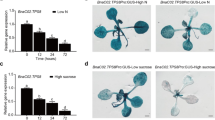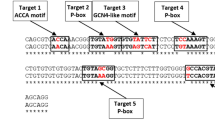Abstract.
Potato (Solanum tuberosum L. cv. Desiré) plants with reduced amounts of P-protein, one of the subunits of glycine decarboxylase (GDC), have been generated by introduction of an antisense transgene. Two transgenic lines, containing about 60–70% less P-protein in the leaves compared to wild-type potato, were analysed in more detail. The reduction in P-protein amount led to a decrease in the ability of leaf mitochondria to decarboxylate glycine. Photosynthetic and growth rates were reduced but the plants were viable under ambient air and produced tubers. Glycine concentrations within the leaves were elevated up to about 100-fold during illumination. Effects on other amino acids and on sucrose and hexoses were minor. Nearly all of the glycine accumulated during the day was metabolised during the following night. The data suggest that the GDC operates far below substrate saturation under normal conditions thus allowing a flexible and fast response to changes in the environment.
Similar content being viewed by others
Author information
Authors and Affiliations
Additional information
Received: 4 March 2000 / Accepted: 26 July 2000
Rights and permissions
About this article
Cite this article
Heineke, D., Bykova, N., Gardeström, P. et al. Metabolic response of potato plants to an antisense reduction of the P-protein of glycine decarboxylase. Planta 212, 880–887 (2001). https://doi.org/10.1007/s004250000460
Issue Date:
DOI: https://doi.org/10.1007/s004250000460




